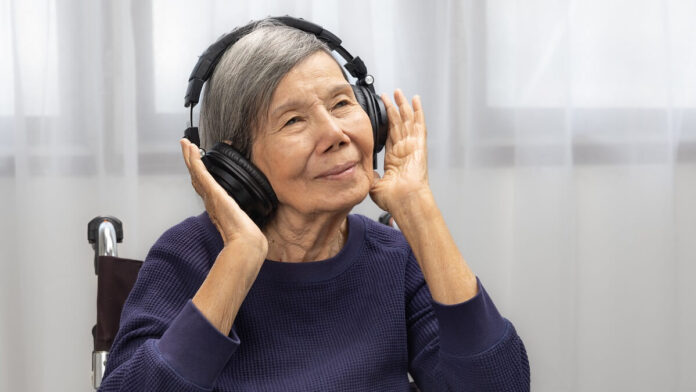Most of us have experienced the powerful effect music can have. Almost everyone will have a song or certain piece of music that conjures up a strong emotion upon hearing it. It will be a different tune for everyone, but the visceral reaction will be very similar.
Now, aged care facilities are using music therapy to provide great benefits to dementia patients.
Over the past couple of decades, expanding research has provided increasing evidence of music therapy providing benefits to dementia patients. A study published in Alzheimer’s Research & Therapy last year showed an improvement in cognitive functions after music therapy application.
The improvements were even better for patients. A greater effect was shown when patients were involved in what’s known as active music intervention. Active music intervention (AMI) involves the direct participation of patients in musical activities. These include singing, playing an instrument, or moving to the beat.
Patients who used receptive musical intervention (RMI) – basically, just listening to music – also showed benefits, but AMI was more effective.
Real-world applications of music therapy
Tricare, which runs retirement living and aged care facilities on Australia’s east coast, actively encourages and supports music therapy. Live music performer Tamsin Sutherland is a regular visitor to Tricare’s Queensland facilities. She has seen many examples of patients coming alive when hearing a favourite tune.
“I perform several different shows,” Ms Sutherland explained. “Each one [is] different from the next, so no matter who’s in the audience, they’re always getting something new.”
Ms Sutherland deliberately incorporates music likely to be familiar to those she is entertaining.
“My one-woman shows include songs and dances from old movies that are familiar and nostalgic to residents,” she says. “It’s all about getting them involved by featuring music from an era they know and love.”
To witness the recognition of and reaction to a known song is a magical moment, Ms Sutherland says. This is especially true of residents who are otherwise non-responsive.
“Watching residents who are often non-verbal sing along to the words is incredible,” she says. “It really is like they are coming back to life and reconnecting with who they once were. To be part of that is quite emotional for me.”
Such moments become of mutual benefit, to the performer and the residents.
For some, just listening is enough
Live performances are not always possible, but access to music in some form is almost always available. This too can provide benefits to those suffering from Alzheimer’s and other forms of dementia.
Louis Rose, a resident of TriCare’s aged care facility in Mt Gravatt in Queensland, exemplifies those benefits. Mr Rose was diagnosed with dementia six years ago. He finds music therapy of enormous benefit at times when he is struggling.
“I grew up in Mauritius and while we didn’t have a lot, we certainly had music. Listening to music has always been an escape for me and a way to relax,” Mr Rose says.
“When your brain starts to slow down and you find yourself forgetting things, it can be quite frustrating and confusing. Listening to music has been a way to distract myself from what’s going on in my head. It has helped me so much.”
Mounting research supports this notion, and the authors of last year’s study suggest we are only scratching the surface.
“More research is needed to fully understand the effects of music therapy, to determine the optimal intervention strategy,” they wrote.
Future studies could also assess the long-term effects of music therapy on cognitive functions.
For many, such as registered music therapist Dr Vicky Abad, the evidence is already clear.
“Music is a window into people’s pasts,” she said. “It builds on strengths and abilities against a disease that can strip a person of their dignity, abilities and quality of life.”
Have you used music therapy? What effect has it had on dementia patients you know? Let us know via the comments section below.
Also read: Dementia on the rise in Australia: report

